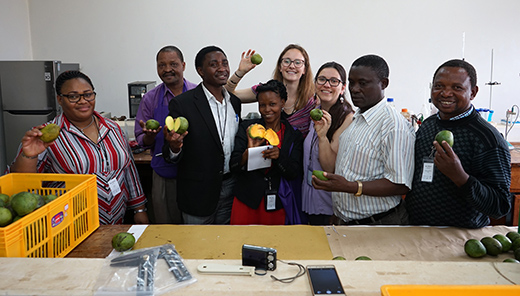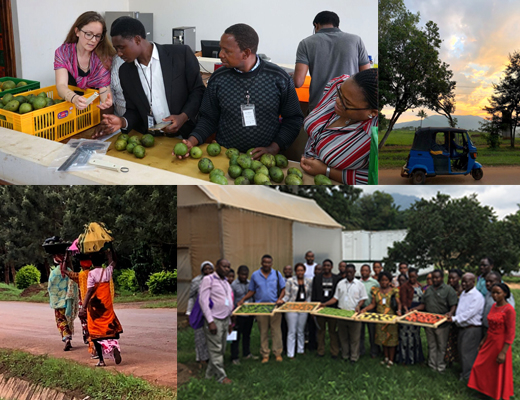Horticulture faculty, students helping growers in Tanzania reduce food loss
Thursday, June 28, 2018

Workshops focused on washing, storing, packing, transporting and protecting fresh fruits and vegetables in an effort to improve food safety and quality in Tanzania while also reducing the country's postharvest loss. | Download this image.
OLATHE — Horticulture faculty and graduate students at Kansas State University's Olathe campus are collaborating with the University of Florida to provide Tanzanian farmers, traders, marketers, students and agriculture extension educators who work with fresh produce get the resources necessary to improve the quality and shelf life of their produce and reduce postharvest losses.
Eleni Pliakoni, assistant professor of urban food production and postharvest handling, and Kelly Gude, doctoral research student in horticulture with an emphasis in postharvest physiology, Kansas City, Missouri, spent May 14-18 in Morogoro, Tanzania, at Sokoine University of Agriculture. There, they led a short course on postharvest handling of fresh fruits and vegetables for 30 local extension educators. Topics included washing, storing, packing, transporting and protecting fresh fruits and vegetables. The participants, who act as extension agents, will teach the information they learned to local growers. The goal is that growers will use the new information and techniques to reduce the large amount of fresh produce that is typically lost after harvest and to improve the quality of produce sold to consumers at open air markets or exported to neighboring countries.
These "train the trainer" workshops are part of a $500,000 project led by Kansas State University in collaboration with the University of Florida, University of California-Davis and Sokoine University of Agriculture in Morogoro, Tanzania. It is funded by the U.S. Agency for International Development's Feed the Future Horticulture Innovation Lab at the University of California-Davis.
Under the partnership, four week-long short courses will be taught in Tanzania — two to extension educators and two to growers. Topics cover a broad range of postharvest loss issues. Courses are meant to start an open dialog with local growers and introduce new ideas as well as potential solutions to Tanzania's food loss challenges.
Researchers also are working with Sokoine University to develop a master's degree program in horticulture with an emphasis in postharvest handling. Kansas State University is developing two courses on postharvest physiology and postharvest handling and technology for the upcoming program. Sara Gragg, assistant professor of animal sciences and industry, is helping with graduate course development.
Food loss is one of the largest strains on Tanzania's food system, Gude said.
"The estimated magnitude of postharvest losses in Tanzania is around half of the freshly grown fruits and vegetables and is usually happening before the produces reaches the consumer," Gude said. "In the U.S., only a small percentage of food waste happens during production and postharvest. Most of the waste happens at the consumer level due to things such as over-purchasing fresh food or the food being thrown away because it is not aesthetically pleasing."
Other food production and postharvest-related challenges include cooling, storage, transportation and preventing and managing pests as well as wildlife, such as monkeys and hippopotamuses.
"Many of these challenges are bigger than what we can address in these sessions," Gude said. "For example, food is often transported by bicycle or on someone's head. Those are the modes of transportation that are integrated into their culture, so we can't tell residents not to do that. Instead, we're trying to work within their culture and suggest things like a liner or some sort of buffer to reduce produce damage and contamination."
Challenges also extend to how food is packaged and sold at markets, Gude said. Currently, commodities are sold by unit rather than weight and are often packaged in large bamboo baskets. This leads to produce getting bruised and ripe fruits being packed with immature or overly ripe fruits — which decreases the shelf-life of all the bundled fruits — because sellers are more concerned about quantity rather than quality of the produce.
U.S. collaborators are seeing results from the project, though.
After teaching short courses about packaging and produce maturity, Pliakoni and Gude challenged the extension educators to sort various commodities of different maturities and qualities and then present their findings to the larger group. The extension trainers used the maturity and quality index resources that were presented earlier in the day to sort the commodities into groups.
Earlier this year, Sokoine University also constructed a horticulture pack-house from shipping containers so that theory learned in the classroom could be applied to real-life practice. The pack-house was built as part of the project and includes a wash station for produce, a sorting and packing facility and two large spaces for cooling and storage. Modified campus infrastructure included outfitting a postharvest lab with attached cold storage area. Gude alone traveled with more than 120 lbs. of equipment and material for the lab and short courses to Morogoro, Tanzania.
In August, Kostas Batziakas, doctoral research student in horticulture with an emphasis in postharvest physiology, Greece, will lead a second week-long session for trainers in Tanzania alongside the University of Florida collaborator, Steve Sargent, professor and extension postharvest specialist.
Cary Rivard, associate professor of horticulture and natural resources, extension specialist and director of the Horticultural Research and Extension Center, will help lead one of the workshops for growers scheduled for 2019.
